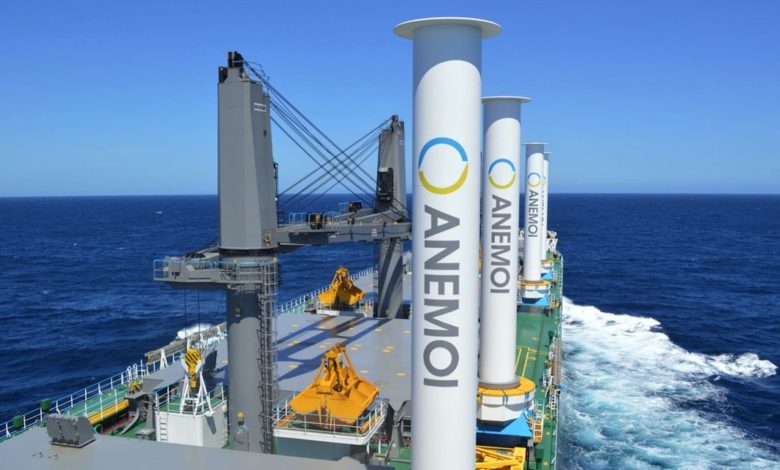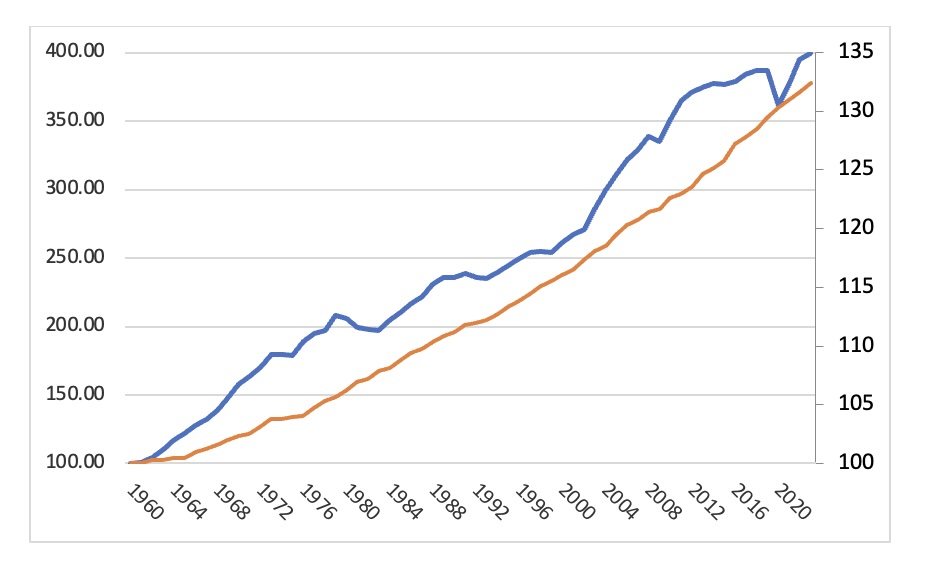Decarbonising the world: a dead horse flogging itself?

Pierre Aury questions whether we have our priorities right when it comes to making the world a greener place.
The Marine Environment Protection Committee had its 81st meeting last month. In a strange case of perhaps the first documented instance of a dead horse flogging itself, shipping has embarked on a crusade to become the only industry in the world that can decarbonise itself fully and quickly! But first the big picture.

The graph shows world CO2 emissions rebased at 100 in 1960 in blue (LHS) and the CO2 concentration in the atmosphere also rebased at 100 in 1960 in red (RHS).
Funnily enough, we have a fixation on the absolute number of tons of CO2 emitted annually when in fact what matters is the concentration of CO2 in the atmosphere which is what is responsible for global warming.
The problem is that 50% of the CO2 emitted will stay more than 120 years in the atmosphere. As can be seen in the graph above the dramatic reduction of emissions due to covid is not reflected in the concentration curve. The concentration of CO2 in the atmosphere will only start to go down the year we emit less CO2 than what disappear naturally from the atmosphere. Taking a half-life of 120 years means that every year about 0.4% of the CO2 present in the atmosphere is disappearing (50/120=0.41) when our emissions have been increasing at a compounded rate of 1.3% per annum over the last 30 years…simple but cruel maths.
In a nutshell all this decarbonising of our economy is indeed the right solution, but will only show results in the long term. Is this the first instance of politicians doing something for a long term gain? Intriguing as well is the fact that the decarbonising framework which is put in place is implicitly based on a fairy tale which goes along these lines. A long time ago human beings were burning wood. Wood was then replaced by coal which in turn was replaced by oil and gas. So we are just about to see a repeat of that phasing out/ phasing in process with now zero carbon or net zero energies about to replace oil and gas. Simple, no? Simple, yes but untrue. Humanity has never burnt more wood than now. In fact, every time a new source of energy appeared it did not replace the previous one, it actually catered for new uses. This phenomenon, known as the rebound effect, also called the Jevons paradox, is well documented over the centuries.
But let us go down now to the sector level. The pie chart below shows selected sectors with their relative share of global CO2 emissions:

Two sectors together account for more than 50% of global emissions: electricity generation and agriculture together cover 53% of all emissions. Add cars and vans and you have 60% of all emissions. Now using, again, simple maths, a decrease of 10% of the emissions of the electricity generation sector would be more than a decrease of 100% of the emissions of the shipping sector. A decrease of 10% of both the electricity generation and agricultural sectors would be more than a decrease of 100% of the emissions of the shipping and aircraft sectors together.
A 30% decrease of emissions of cars and vans would equate to all emissions of the shipping sector. We know how to cut car emissions by 30% – just go away from two tons or more cars to one ton cars as we used to have not so long ago which we are nowhere near to be doing while at the same time we are kitting dry bulkers with kites.

Couldn’t agree more, air quality is far more likely to kill us before an excess of carbon does. That is where we should be focusing our efforts! Problem is, like so many things in today’s world, it’s impossible to debate without being accused of being something ended in ism or phobia.
OK, so other industries should be doing as much – or even a lot more – than shipping is doing. But I happen to work in shipping. I can contribute to emission reductions in shipping. I can’t do much about how farmers in China or India operate. But I and my colleagues can certainly do ours to reduce emissions in the shipping of our products in Northern Europe. As I am assuing noone honestly suggests we sit on our hands and do nothing, I will focus my efforts where I can make an impact. And that is by encouraging – not flogging – this very alive and kicking horse that is shortsea bulk shipping.
At the heart of this and similar articles is a misunderstanding of the fundamental economics of shipping. Forget emissions, look at the money: Put simply, oil / diesel is very expensive and has always increased in price, and if you operate ships you will know that it is a high and increasing % of opex. Electricity from solar is the lowest cost power, and the cost of generation is decreasing at an almost exponential rate. If you want to reduce your opex over the long term and increase your profits, find ways to move to electric propulsion and locally generated solar power as fast as you can.
Also Shipping at 2% is an underestimate, most report nearer 3% and this does not include the millions of smaller powered vessels that are simply not included in the records, but are vital to the “shipping” industry, or the fact that the IEA os forecasting this will increase by 2050.
Bravo, Pierre – you are better than I thought!!!! What you say is so true!
Best
Dagfinn
The “green” goal here is to reduce GHG emitted to the atmosphere. And the only intelligent way to compare any of these so-called “green solutions” is to perform and compare full, life-cycle analyses of all emitted GHG for each so-called “green solution.” These analyses must include all GHGs emitted during the mining and transportation of all materials, manufacturing, life-time usage and recycling of all involved components.
Without these real-world quantitative GHG life-cycle emission comparisons to actually achieve the goal of reducing GHGs, all so-called “green solutions” are nothing but smoke and mirrors fueling blind beliefs of misled and confused cults and agendas.
Sort-of interesting blah blah blah (?) with a major missed point … that being … Too Many People!
“… in fact what matters is the concentration of CO2 in the atmosphere which is what is responsible for global warming.” ~ AND ~ “In a nutshell all this decarbonising of our economy is indeed the right solution …” ~ BUTT ~ No mention of the dual facts that we have too many people with more coming … and … everyone of them wants what the others have as a result of the Industrial Revolution … they are no longer happy to cook over a dried-cow-pie fire & stay home.
Bruce,
Overpopulated ?
You need to do some real independent research, we are currently facing a huge global population crash.
More people are infertile due to health issues caused by plastic contamination in our bodies, others are not having children due to an unstable world be it economical or wars etc.
If you took all the people in the world, you could easily fit them all on the small island of Britain. Hardly “overpopulated”.
I hear your bogus claim of “too many people” too often, who do you plan to get rid of and how exactly ?
Plants need CO2 to survive. Now we are on 400ppm. If we get to 200ppm that will be the end of plants, animals and humans. Dinosaurs and the lush vegetation back then had about 5000ppm of CO2.
This carbon neutral lunacy and fake science is a giant scam.
Pierre Aury, thank you for an refreshing angle. As you state, we do need to decarbonizing of our economy, and the key question is where we get “most bang for the buck”. It might seem easier to decarbonize cars and some of the other industries, but not all other industries. To me producing zero carbon steel and cement certainly appears tall challenges too.
We are starting to see emissions having a direct cost for all industries. For shipping, the EU ETS is adding costs on emissions and Fuel EU Maritime is commencing next year. So, if you have the ship with lesser EUA cost and that meets the Fuel EU Maritime thresholds, you will have a commercial advantage on your competitors. If your ship is on the other end of the scale, you could to some extent “pay your way out” and leave it to others owners and industries to decarbonize. However, this might become a very costly strategy though, if and when IMO and regulators in the US, China and elsewhere will follow suit on EUs lead.
How sad – another dinosaur. All sectors must do all possible to decarbonise now. Shipping is not a hard ot abate sector, Yup, there is a lot of work to do in other sectors but your thesis that this means we shouldn’t do all we can in shipping is simply b/s. As usual, it sis the poorest and weakest who are already paying the highest price while the deckchair brigade pontificates on
Reduce carbon they say, while they are increasing carbon.
The total hypocrisy of it all.
They blew up the “greenhouse” gas pipelines Nord Stream that released how much gas ?, shipping items across the world that could easily be produced locally, cutting down the worlds forests for a fast profit while not replanting any trees, saying they are reducing plastic while they are actually increasing disposable toxic waste plastic in the market, EV’s also produce carbon in their manufacture and fuelling, attacking oil instillations in war zones, the Shell corporation that indulges in burning off masses of “surplus gas” that they claim “they can’t sell the gas and they have too much in storage to keep it” because they don’t want to lower prices for the consumer etc.
What about that old ozone issue nobody talks about anymore, the damage caused by nuclear bomb tests, the HFC’s that replaced the less polluting CFC’s that still gas off in the landfill or oceans etc.
How about we plant more trees, carbon is plant food. But nahhh…
There is money to be made by pushing the carbon hoax, nations industries to be smashed, forced purchases and new taxes to be levied from the public that they exploit like cattle on a daily basis.
It’s just another gangster bankster scam and the public just say moo while they chew the cud waiting for the slaughter.
The lunatics are running the asylum.